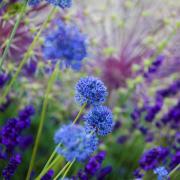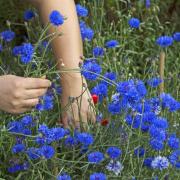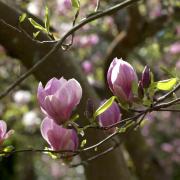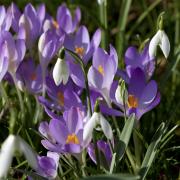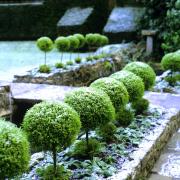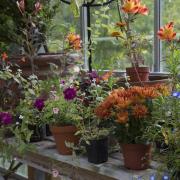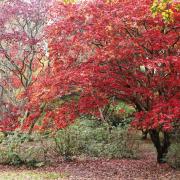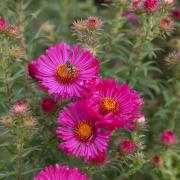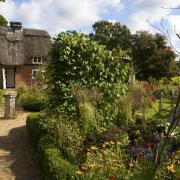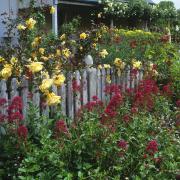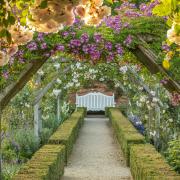From tending to herbs such as lavender and rosemary to adding roses and traditional roots, our gardens can give so much more when they are planted with healing plants says Leigh Clapp
One of the best ways to remove yourself from the stresses of life is to get outside and into nature. Highlighted during the pandemic and with more people discovering the many benefits to their wellbeing, gardening has surged in popularity, whether a few indoor plants, a window box or transforming a garden plot. There are benefits we may not fully realize, for both physical and mental health, with gardening now even being prescribed by the medical profession.
Gardens serve many purposes: cultivation, as spaces for exercise, relaxation, solace and recovery; used as places to play, meet and volunteer. The beauty of a garden fills our souls with joy, while the act of cultivation gives us a tangible sense of achievement as we watch the plants we nurture thrive and blossom. Gardening allows you to be mindful, focus on what you are doing, and let the worries melt away.
Digging in the dirt and then caring and tending for plants can have incredible effects on your health. Whether it’s a gorgeous bunch of scented sweet peas you can pick for your loved ones or the ingredients for a fresh salad straight out of the garden, there is something special about the act of growing.

Garden visiting and taking time to look at the magic around you, the colours and scents, sunlight catching on leaves, bees foraging in the blooms, also allows you to really appreciate the moment. Access to gardens has been linked to reducing a range of issues, including depression, loneliness, stress, alleviating symptoms of dementia, improving a sense of personal achievement among children and benefiting conditions such as heart disease, cancer and obesity.
As well as the healthy and calming atmosphere found in a garden you could go a step further and grow some specific plants, for their medicinal and therapeutic use as natural foods and remedies. You can pop them amongst your plants or create a dedicated healing garden, or even a container in an easy to access spot. You could already have beneficial plants growing in your garden and not even know it.

Before manufactured medicines people relied on the healing properties of roots, trees and plants, some cultures still embrace these traditional methods and there is a definite appetite to reconnect with this knowledge. You may marvel at the way medicinal qualities of plants were discovered, many of which are dangerously poisonous if handled wrongly, how there must have been trials and disasters. Modern medical science analyses and purifies the active ingredients, but there are still things to learn, with plant drugs continuing to be discovered.
Visiting the Petersfield Physic Garden will give you an insight and also ideas for formal herb garden layout designs.
‘We are very much about a ‘healing garden’, being a physic garden in the style of the 17th century, when the majority of healing was through the use of medicinal herbs, but also because we are very much a quiet, green oasis of peace in the centre of a busy town,’ comments garden manager Jenny Hill.

Laid out in a traditional formal pattern with an array of herbs, including chamomile, borage, chicory, winter savoury, rosemary, fennel and lovage, the garden can help you identify and learn about how they were used in the past. ‘We are very careful to emphasise that the uses were related to their use in the 17th century and not the 21st century, doing so could be dangerous. As a side note when talking to gardening groups, I do point out the fact that one of our aims is the preservation of healing plants. In May in the first lockdown year the press reported that the President of Madagascar had declared that his country had produced a cure for Covid, a wormwood based tonic. At the time the WHO stated there was no scientific evidence for this and advised against it. In September of last year the press reported the WHO were now investigating the use of wormwood in the treatment of hospitalised patients; this emphasizes how important it is to preserve our plants,’ adds Jenny.
To stock your garden or container with a wonderful selection of herbs take a look at Pepperpot Herbs in Alton, predominantly an online mail-order nursery, where you will find around 200 varieties – from herb starter packs, mints and chives to celery leaf and sweet woodruff. Horticulturalist Neil Wallsgrove and his wife, Catherine who manages the retail side of things, began the nursery in 1988 and specialises in herbs as they ‘look good, smell good and taste good’.

‘We often hear customers say ‘I can’t grow herbs’, when in fact there are many different plant species in the category and success is easy if you consider where the plants would naturally grow. For example, most Mediterranean herbs, such as lavender, rosemary, sage and oregano, would naturally grow in sunny, dry, free draining soils. Find the place nearest to those conditions in your garden and you will have success.
The couple don’t tend to use herbs specifically for their medicinal qualities but are aware of their many benefits when incorporated with food dishes.
‘We are big drinkers of mint tea, mainly for the fresh taste, but it’s also good for digestion. We also drink lemon verbena, hot or cold, for teas or added to cocktails, it also combines well with mint. The most frequent medicinal use customers ask about is feverfew for migraine control,’ Neil comments.

In your mix of culinary and medicinal plants include some native herbs that our forefather would have used, such as marsh mallow, which was eaten like potato or to thicken stock. There are different extraction methods for fresh and dried parts of plants and numerous ways to prepare herbal medicine, such as infusions in water, oil, creams, alcohol tinctures and juices. An herbal infusion or tisane is the easiest way to enjoy the various flavours of herbs, leaves, flowers and seeds, as a relaxing drink, remedy or dietary supplement.
Herbal infusions release vitamins and minerals for short or long benefits, can be calming, improve your mood or aid digestion. Examples of infusions include chamomile flowers and buds to ease anxiety, lemongrass to lift the spirit and mint to ease an upset stomach. You could also grow your own first aid kit, such as aloe sap as an antiseptic, yarrow leaves to treat cuts and scrapes, or a crushed garlic clove to soothe a bee sting.
A word of caution however, do your research. Herbs are the foundation of all our medicines, but don’t think they are mild, if you are taking manufactured medicines they can react, so always be cautious. Never experiment, self-medication is dangerous so seek advice from a healthcare professional or expert.

Pay a visit
Petersfield Physic Garden, Petersfield, GU32 3JJ
Open 9am to 6pm in summer, to 4.30pm in winter
Entry free but donations welcome
petersfieldphysicgarden.org.uk
Pepperpot Herb Nursery, Alton, GU34 3HL
Online mail order and at retail events
pepperpotherbplants.co.uk

Top tips
- Grow organically to avoid ingesting chemicals.
- We’re not aiming to replace a visit to your doctor or medical herbalist, however plants with complementary benefits for minor ailments or to improve general wellbeing can be grown safely in your own garden.
- Generally, to make an herbal infusion, place a tablespoon of dried herbs, or three tablespoons of fresh, into a teapot or jar, cover with boiling water and let steep, strain before serving.
- To dry herbs – cut sprigs, tie in bundles and hang upside down, once dry store in a glass jar in a cool, dark place.
- Eucalyptus gives a positive mind-set, rub the leaves with your finger tips to start your day.
- Roses are harmonious, put a bunch in a vase where you want to retreat at the end of a day.
- Lavender is calming and helps sleep.





